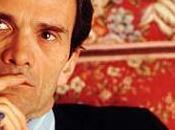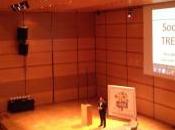In primo luogo abbiamo chiesto ad Arianna come è arrivata a fare parte del team di giovani costituito dal Ministro Profumo: dopo aver visto il bando pubblicizzato su Facebook, ha scoperto che stavano cercando un dottorato proprio nell'area in cui l'aveva fatto lei, quindi dopo aver mandato il cv è stata contattata per un colloquio, occasione in cui ha capito anche quale sarebbe stato il ruolo che avrebbe ricoperto. [video]
Arianna ha studiato Scienze della Comunicazione a Siena, si è laureata in Comunicazione di Massa, con l'intento di intraprendere una carriera nell'ambito del giornalismo e della televisione. Nel tempo si è interessata sempre di più ai nuovi media e al web, e dopo aver finito l'università ha cominciato a lavorare in un centro di ricerca di Dublino, il MediaLab Europe, partner del MIT MediaLab, facendo interaction design. Lì ha cominciato a progettare interfacce mobile, che hanno a che fare con la musica. In seguito ha ottenuto il dottorato in Management of Information Systems alla London School of Economics. [video]
Abbiamo naturalmente chiesto ad Arianna quali saranno i punti dell'agenda digitale che verranno presi in considerazione durante il Governo Monti. I temi sono tantissimi, e il team sta identificando le aree e i progetti a cui lavoreranno: quel che è certo è che avranno un ruolo di rilievo sul lato di progettazione interfacce, progetti tecnologici e integrazione a livello internazionale. [video]
Si tratta di un'occasione per puntare su un fenomeno emergente e trasformarlo in crescita, sia dal punto di vista sociale che economico. La diffusione della banda larga, ad esempio, porta punti di pil all'anno. L'agenda digitale prevederà infatti tra i punti più importanti l'ultimo miglio e la banda larga: c'è l'occasione, spinti dall'Unione Europea, di sviluppare sempre di più l'accesso alle nuove tecnologie. [video]
Abbiamo chiesto ad Arianna quali sarebbero gli obiettivi più importanti da raggiungere nei prossimi 6 - 12 mesi. A suo avviso ci sono già tante iniziative che devono essere sbloccate, specialmente quelle che hanno a che fare con l'egovernment, e soprattutto a livello di comunicazione ci sarebbe tanto lavoro da fare. Un altro aspetto importante sarebbe contribuire a migliorare l'immagine dell'Italia all'estero, enfatizzando quegli aspetti positivi che al momento non sono adeguatamente pubblicizzati. [video]
Molte iniziative faticano a partire per problemi burocratici, e c'è da considerare l'aspetto di cambiamento della legislazione e i relativi tempi tecnici necessari per implementare tali cambiamenti. La semplificazione dei processi è fondamentale per facilitare l'apertura e la crescita delle startup e delle aziende. Al momento inoltre è assente un supporto governativo che sia in grado di informare e indirizzare correttamente coloro che vogliono intraprendere questa strada dal punto di vista pratico. [video]
Vi invito a visionare l'intervista completa, decisamente più ricca di spunti e riflessioni rispetto a questa mia breve sintesi.
Buona visione!
Maria Petrescu
Photo credit: Joi Ito
10 minutes with Arianna Bassoli
During this interview with Arianna Bassoli, Italian startupper and interaction designer, we've talked about her professional background, the path that led her to the Ministry of Instruction and about her startup, Frestyl.
First of all we asked Arianna how she got to be part of the team of young people constituted by the Minister Profumo: after seeing the notice on Facebook, she discovered that they were looking for a doctorate in the same field she had done hers, so after sending her CV she was contacted for an interview, where she also understood what role she was going to cover. [video]
Arianna studied Communication Sciences in Siena, she graduated in Mass Communication with the intent of starting a carreer in the fields of journalism and television. In time she got more and more interested in new media and the web, and after university she started working in a research center in Dublin, the MediaLab Europe, partner of the MIT MediaLab, working on interaction design. There she started projecting mobile interfaces, which have to do with music. Afterwards she got a doctorate in Management of Information Systems at the London School of Economics. [video]
We asked Aranna what will the main points of the digital agenda be, especially during the Monti government. The themes are numerous, and the team is identifying the areas and the projects on which they will be working: what's certain is that they will have an important role in the realization of interfaces, technological projects and international integration. [video]
There has been a lot of talking about startups, social innovation, infrastructures, open data: in Arianna's opinion the Government should exploit the energy of Italian startups and support them with facilitations when it comes to bureaucracy, projects, but most of all creating a long term plan that will allow the creation of new businesses and jobs.
It's a great opportunity to gamble on a growing phenomenon and transform it in growth, both from the social and the economical point of view. The diffusion of broadband, for example, brings points of GDP a year. The digital agenda will include, among its most important points, broadband and the last mile: it is the opportunity to develop access to new technologies, supported by the European Union. [video]
We asked Arianna what the most important goals would be, at least for the next 6 - 12 months. In her opinion there are already a lot of initiatives that should be unlocked, especially those that have to do with e-government, and the communication should be greatly improved. Another important aspect would be contributing to make Italy's reputation better, emphasizing those positive aspects that at the moment aren't adequately publicized. [video]
Many initiatives have rough starts because of bureaucratic problems, and there's also the law changes and the related technical timing to implement those changes to consider. Simplifying processes is fundamental to make opening and making startups and businesses growth easier. Moreover, at the moment there is no government support that is capable of giving correct information and instructions to those who want to go on this path, from a practical point of view. [video]
I invite everyone to view the full interview, much richer in details and insights than my brief synthesis.
Enjoy!
Maria Petrescu





